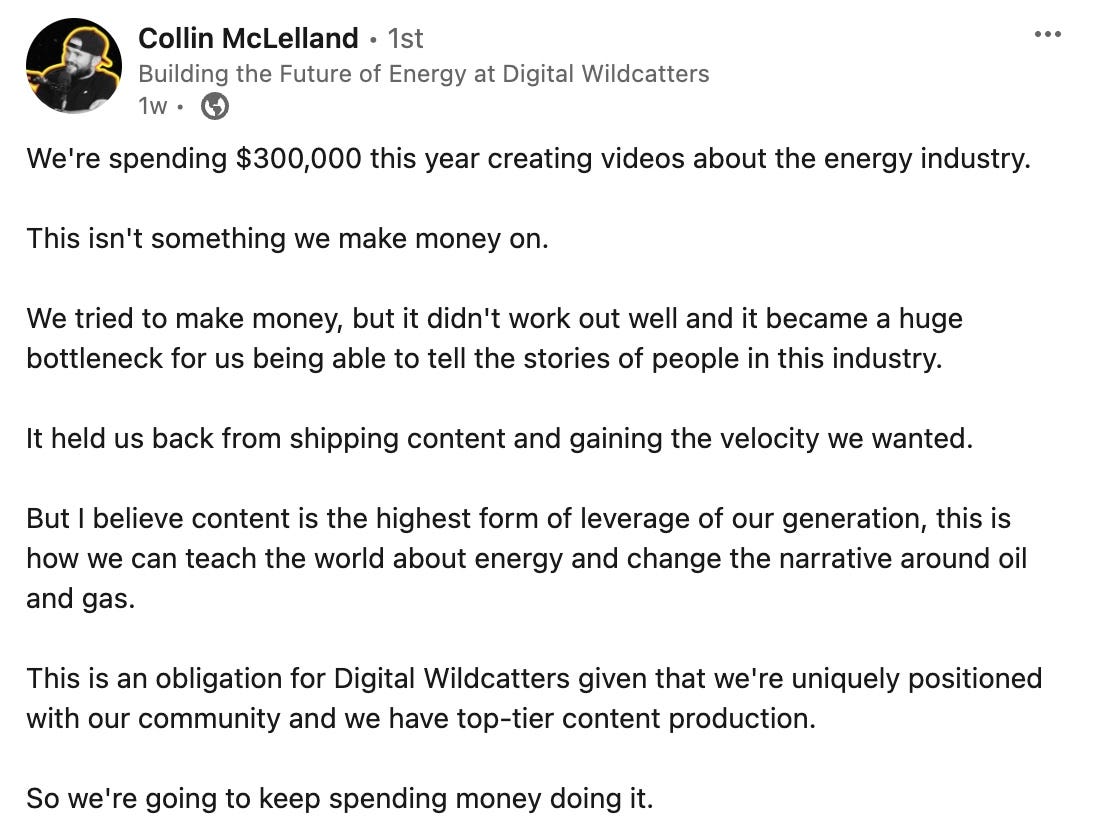I love Digital Wildcatters. Collin McCleland does amazing work, and you should definitely check out the interview I did with him a while ago. Part of his vision is inviting the public into the oil patch to show them how it’s done. His latest video with wireline operator, Andy De La Rosa (also a former guest on the podcast) is well worth watching:
The video is really fun and gives viewers an insight into how Andy and his crew “shoot guns” out in the Permian. Yet what struck me wasn’t just the video, but something Collin posted to LinkedIn.
Collin’s on a mission to take back the narrative on oil and gas — he and I are completely aligned on this. The climate narrative is a major obstacle to industrial development in America. Anyone who’s been paying attention knows this. But Collin and the rest of the Digital Wildcatters team are willing to change the narrative even if they’re going to lose over a quarter of a million dollars on it.
That doesn’t mean Digital Wildcatters will actually lose that money, of course. Yet this fight is a spiritual war—a struggle against harm reductionist lawfare on behalf of our industrial commons and societal wealth. Collin and the DW team are putting their money where their mouths are on this one.
And this got me thinking: where the hell is the nuclear industry on this? They’ve been gifted a HUGE LANE to drive through the all renewables ideology with a Peterbilt and they’re…doing what, exactly?
I’m not talking about the advanced reactor companies. Every time they talk, they’re doing both advertising and advocacy. And they have a vested interest in getting in front of people.
I’m talking about the legacy industry. And not just Westinghouse or GE-Hitachi and some of the utilities. There are also adjacent engineering firms that have their roots in the dawn of the electric era, who still do awe-inspiring work, but who don’t even have Wikipedia pages. How is anyone supposed to admire your work if no one knows you exist?
This comms famine belies a major problem I see in the traditional energy industry: You think that because you’re right, you will win, and that because you are necessary, you will be treated as such.
I love the traditional nuclear industry, but it needs to wake up. The anti-nuclear Environmental Defense Fund has a satellite and some of the industry doesn’t even seem to have an advertising budget. It’s time to get in the game.
If you liked this, there are several ways you can support my work.
Subscribe, or, if you’re feeling generous, upgrade to paid. All my content is free, but I greatly appreciate any extra support I receive:
Check out my other newsletter, Grid Brief. I cover energy news from all over the world, and premium subscribers get exclusive insights into international and domestic energy issues plus a weekly look under the hood of America’s power markets.
Share this post with friends!






Hi Emmet,
I also used to wonder why people like myself and Rod Adams and Howard Shaffer were defending nuclear plants, and the industry itself was overly silent. Rod helped me figure out that there is no "nuclear industry." The biggest companies in nuclear tend to be utilities that own nuclear plants. Those companies ALSO own fossil and renewable plants. So they aren't going to push nuclear. As another friend said: you don't shoot yourself in one foot to make the other foot feel better.
The startup nuclear companies don't own any other type of plant. So they can be clear advocates.
I agree with Meredith Angwin regarding the P.R. problem for utilities with both nuclear and fossil. Constellation Energy (CEG,) the biggest owner of nuclear power plants in America owns 21 reactors. Their share price has done well The firm was spun off on January 21, 2022 at $45.00 per share. CEG closed at $178.24 on March 22, 2024 with a market capitalization of $56.44 billion. I look forward to more positive nuclear power P.R. from CEG. I will prod my CEG contact.